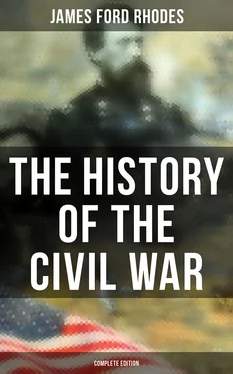Frémont's proclamation stirred the anti-slavery sentiment of the country to its utmost depths, receiving enthusiastic commendation from many States. Senator Sumner wrote, "Our President is now dictator, imperator-which you will; but how vain to have the power of a god and not use it godlike!" A large number of men in Ohio were furious and found fit expression in the words of an eminent lawyer and judge: "Our people are in a state of great consternation and wrath on account of the quarrel between Frémont and the administration, public opinion being entirely with General Frémont.… And if the election were next fall, to displace him would be to make him president." Herndon, the old law partner and later biographer of Lincoln, living in Illinois, said, "Frémont's proclamation was right. Lincoln's modification of it was wrong." Senator Grimes wrote from Iowa: "The people are all with Frémont and will uphold him 'through thick and thin.'… Everybody of every sect, party, sex and color approves his proclamation in the Northwest and it will not do for the administration to causelessly tamper with the man who had the sublime moral courage to issue it." 9
These expressions in private letters represented a phase of intelligent sentiment which troubled Lincoln, as is evident from his confidential letter to Senator Browning of Illinois, who, though regarded as a conservative, had approved Frémont's proclamation. It endangers the loss of Kentucky, he wrote [September 22]. "I think to lose Kentucky is nearly the same as to lose the whole game. Kentucky gone, we cannot hold Missouri, nor, as I think, Maryland. These all against us and the job on our hands is too large for us. We would as well consent to separation at once, including the surrender of this capital." Lincoln had such a hold upon the people that he carried with him an efficient public opinion and, after due waiting, proceeded to the next step. He never had any thought of removing Frémont on account of his proclamation; but he felt that the mismanagement and corruption in Missouri must be corrected. Proceeding with caution, he sent to St. Louis Montgomery Blair and Meigs, the Quartermaster-General of the Army, and later Secretary Cameron and Adjutant-General Thomas: the four made a thorough and candid investigation.
Meigs heard a rumor that Frémont had in mind a project resembling the conspiracy of Aaron Burr's. Somewhat more than two years later Lincoln, in an expansive mood, unbosomed himself to his private secretaries and two other friends, saying, Mrs. Frémont (who had brought a letter from the General justifying his proclamation) "sought an audience with me at midnight 10and taxed me so violently with many things that I had to exercise all the awkward tact I have to avoid quarreling with her.… She more than once intimated that if General Frémont should conclude to try conclusions with me, he could set up for himself." To this, the minister of the United States to Prussia, an old Illinois friend of Lincoln's, replied: "It is pretty clearly proven that Frémont had at that time concluded that the Union was definitely destroyed, and that he should set up an independent government as soon as he took Memphis and organized his army." 11That Lincoln felt there was some basis for this report is indicated by a paper which Nicolay left in a sealed envelope endorsed: "A private paper, Conversation with the President, October 2, 1861," in which one of the headings is "Frémont ready to rebel." 12Nevertheless, it is hardly probable that Lincoln was disturbed enough by the report to let it have the slightest weight in his action. It was more to the point that Montgomery Blair had recommended Frémont's removal for inefficiency and that Cameron's and Thomas's conclusions had made it imperative. These two reported that Frémont "was incompetent and unfit for his extensive and important command" and that he had "around him in his staff persons directly and indirectly concerned in furnishing supplies." On October 24, the President issued the order for his removal. Before the removal was effected, E. B. Washburne, an intimate friend of Lincoln's, who was at the head of the House sub-committee on government contracts that spent two weeks in St. Louis, taking a large amount of testimony relative to the procedure of Frémont and his friends, wrote to Chase: 13"Such robbery, fraud, extravagance, peculation as have been developed in Frémont's department can hardly be conceived of. There has been an organized system of pillage, right under his eye.… He has really set up an authority over the government and bids defiance to its commands. The government in failing to strike at Frémont and his horde of pirates acknowledges itself a failure." Lincoln must have seen this letter, and if further justification for Frémont's removal were necessary, this was ample.
While the people of the country could not know of these confidential letters and reports, enough was known for Lincoln's action to receive effective support. But a large minority looked upon Frémont as a martyr in the antislavery cause. Here are two out of the many instances of worthy people who were led astray by a charlatan because he knew how to play upon the one idea dearest to their hearts. Henry Ward Beecher said in his church, "I cannot but express my solemn conviction that both our government, and in a greater degree the community, have done great injustice to the cause in Missouri, in the treatment which has been bestowed upon that noble man General Frémont." "Is it known to the administration that the West is threatened with a revolution?" asked in a private letter Richard Smith, the editor of the Cincinnati Gazette, a very important and influential Republican journal. "What meaneth this burning of the President in effigy by citizens who have hitherto sincerely and enthusiastically supported the war? … Why this sudden check to enlistments?… The public consider that Frémont has been made a martyr of.… Consequently he is now, so far as the West is concerned, the most popular man in the country. He is to the West what Napoleon was to France; while the President has lost the confidence of the people." 14Meanwhile, McClellan was at work with energy and talent, erecting fortifications around Washington and organizing the "Army of the Potomac." He had good executive ability, and aptitude for system, and, being in robust health, an immense capacity for work. All these qualities were devoted without stint to the service. In the saddle from morning to night, he visited the several camps, mixed with the different brigades and regiments and came to know his officers and men thoroughly. Himself a gentleman of sterling moral character, having come to Washington with the respect and admiration of these soldiers, he soon gained their love by his winning personality, and inspired a devotion such as no other Northern general of a large army, with one exception, was ever able to obtain. Overrating his successes in western Virginia, he was called "the young Napoleon," for he was believed by the army, the administration and the country to have military genius of the highest order. And at first he seemed to have an adequate idea of what was required of him, for he wrote to the President on August 4: "The military action of the Government should be prompt and irresistible. The rebels have chosen Virginia as their battle field, and it seems proper for us to make the first great struggle there." 15
Not only was McClellan working with diligence but everyone else was coöperating with him in a way to give his talent for organization the widest scope. The President, the Treasury and the War departments, the Secretary of State, the governors of the Northern States assisted him faithfully with their full powers. The officers under him displayed zeal and devotion. He had the sway of a monarch. And at the outset this complete harmony yielded results of a most encouraging nature. Troops poured in from the enthusiastic North, swelling the army of 52,000 of July 27 to one of 168,000 three months later.
Читать дальше












